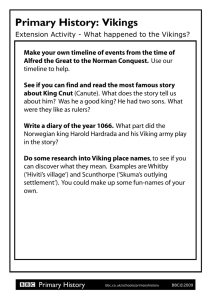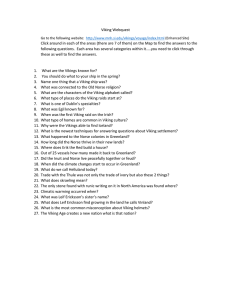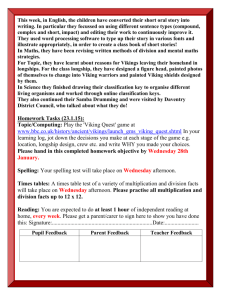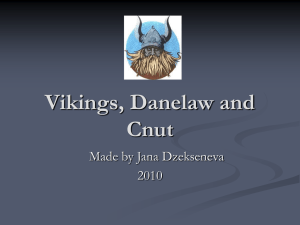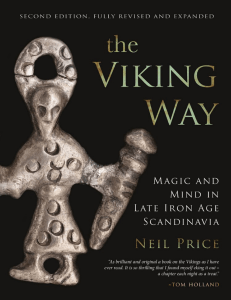Timeline of People and Events
advertisement
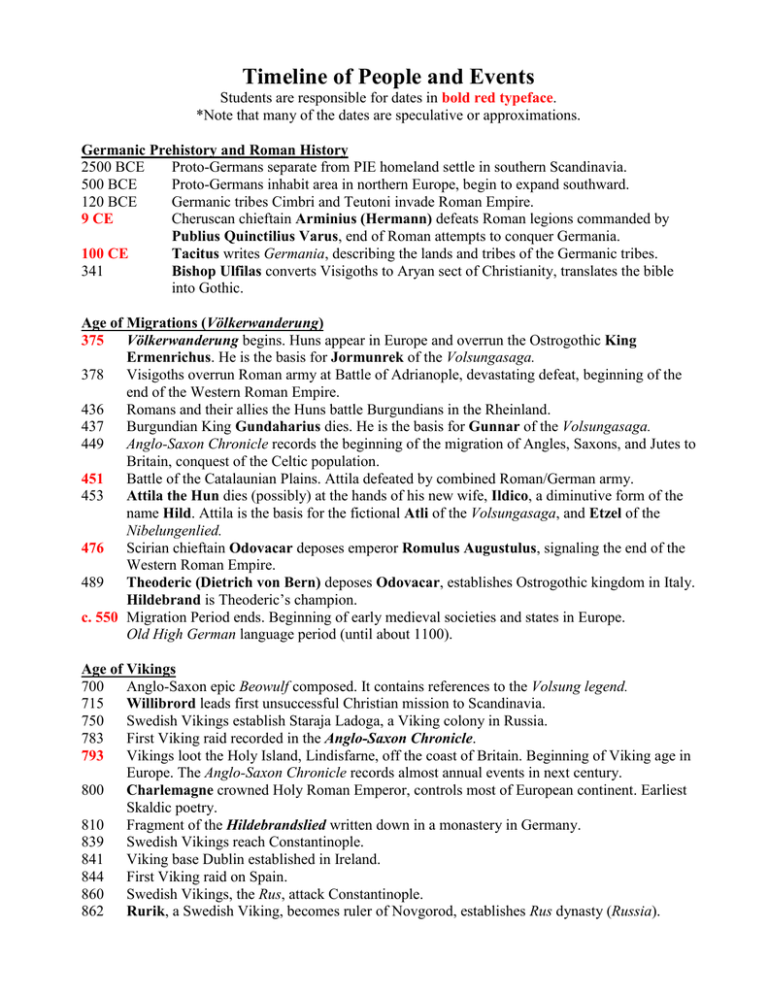
Timeline of People and Events Students are responsible for dates in bold red typeface. *Note that many of the dates are speculative or approximations. Germanic Prehistory and Roman History 2500 BCE Proto-Germans separate from PIE homeland settle in southern Scandinavia. 500 BCE Proto-Germans inhabit area in northern Europe, begin to expand southward. 120 BCE Germanic tribes Cimbri and Teutoni invade Roman Empire. 9 CE Cheruscan chieftain Arminius (Hermann) defeats Roman legions commanded by Publius Quinctilius Varus, end of Roman attempts to conquer Germania. 100 CE Tacitus writes Germania, describing the lands and tribes of the Germanic tribes. 341 Bishop Ulfilas converts Visigoths to Aryan sect of Christianity, translates the bible into Gothic. Age of Migrations (Völkerwanderung) 375 Völkerwanderung begins. Huns appear in Europe and overrun the Ostrogothic King Ermenrichus. He is the basis for Jormunrek of the Volsungasaga. 378 Visigoths overrun Roman army at Battle of Adrianople, devastating defeat, beginning of the end of the Western Roman Empire. 436 Romans and their allies the Huns battle Burgundians in the Rheinland. 437 Burgundian King Gundaharius dies. He is the basis for Gunnar of the Volsungasaga. 449 Anglo-Saxon Chronicle records the beginning of the migration of Angles, Saxons, and Jutes to Britain, conquest of the Celtic population. 451 Battle of the Catalaunian Plains. Attila defeated by combined Roman/German army. 453 Attila the Hun dies (possibly) at the hands of his new wife, Ildico, a diminutive form of the name Hild. Attila is the basis for the fictional Atli of the Volsungasaga, and Etzel of the Nibelungenlied. 476 Scirian chieftain Odovacar deposes emperor Romulus Augustulus, signaling the end of the Western Roman Empire. 489 Theoderic (Dietrich von Bern) deposes Odovacar, establishes Ostrogothic kingdom in Italy. Hildebrand is Theoderic’s champion. c. 550 Migration Period ends. Beginning of early medieval societies and states in Europe. Old High German language period (until about 1100). Age of Vikings 700 Anglo-Saxon epic Beowulf composed. It contains references to the Volsung legend. 715 Willibrord leads first unsuccessful Christian mission to Scandinavia. 750 Swedish Vikings establish Staraja Ladoga, a Viking colony in Russia. 783 First Viking raid recorded in the Anglo-Saxon Chronicle. 793 Vikings loot the Holy Island, Lindisfarne, off the coast of Britain. Beginning of Viking age in Europe. The Anglo-Saxon Chronicle records almost annual events in next century. 800 Charlemagne crowned Holy Roman Emperor, controls most of European continent. Earliest Skaldic poetry. 810 Fragment of the Hildebrandslied written down in a monastery in Germany. 839 Swedish Vikings reach Constantinople. 841 Viking base Dublin established in Ireland. 844 First Viking raid on Spain. 860 Swedish Vikings, the Rus, attack Constantinople. 862 Rurik, a Swedish Viking, becomes ruler of Novgorod, establishes Rus dynasty (Russia). 862 870 880 900 911 919 930 936 958 960 980 985 988 995 1000 1014 1015 1019 1045 1066 Finns and Slavs invite Rurik and the Rus to rule over them, origin of Russian state. Vikings begin settlement of Iceland. Harald Fairhair King of all Norway. Thjodolf of Hvinir a poet of Harald Fairhair, composes Ynglinga Tal and Haustlong. Rollo (Hrolf Gangr) founds Normandy (land of the Norsemen), a Viking settlement in northern France. Heinrich the Falconer elected first King of Germany, beginning of medieval German state. Althing established on Iceland, beginning of the Icelandic Republic. Erik Bloodaxe King of Norway. Hakon the Good King of Norway. Harald Bluetooth King of Denmark, converts Denmark to Christianity in 965. Harald Greycloak King of Norway. Varangian guard (consisting only by Scandinavians) formed at Constantinople. Eirik the Red sails from Iceland with a group of settlers headed to Greenland. Vladimir of Kiev converts to Christianity, Russia becomes independent Slavic state. Olaf Tryggvason king of Norway. Conversion of Iceland to Christianity. Leif Erikson winters in Vinland. Runestone (Ramsund carving) in Sweden depicts Sigurd roasting Fafnir's heart. Irish King Brian Boru defeats Norse in battle of Clontarf (mentioned in Njal’s Saga). Olaf Haraldson (St. Olaf) king of Norway. Cnut the Great King of Denmark and England. Harald Hardrada becomes king of Norway. Harold Hardrada killed at Battle of Stamford Bridge in England. William the Conquerer, great-great-great-grandson of Rollo, conquers England. End of the Viking Age. Medieval History of German and Norse Lands 1100 Middle High German language period (to about 1400) 1075 Adam of Bremen writes Gesta Hammaburgensis Ecclesiae Pontificum which includes description of heathen Norse rituals at Uppsala. 1080 Pagan ceremonies at Uppsala, Sweden come to an end. 1125 Icelandic Landnamabok (Book of Settlement) written, chronicles the Age of Settlement in Iceland. 1185 Danish History of Saxo Grammaticus written, containing descriptions of Norse myths. 1200 Oldest Icelandic family sagas written down. 1210 Nibelungenlied composed by unknown poet in Southern Germany or Austria. 1220 Prose Edda of Snorri Sturluson composed. 1260 Volsunga Saga composed by unknown poet in Iceland. The only manuscript still in existence dates from c. 1400. 1270 Codex Regius manuscript of the Elder Edda written down, containing older Norse myths and many of the poetic lays which form the basis for the prose Volsunga Saga. 1261 Greenland comes under Norwegian rule. 1262 Iceland comes under Norwegian rule, end of the Republic. 1271 End of the Rus dynasty in Russia. 1280 Vinland sagas (Eirik the Red’s Saga and Saga of the Greenlanders) written down. 1300 1300-1350 1375 Njal’s Saga composed. Approximate dates for the legendary Till Eulenspiegel (if such a person ever existed). Western Settlement in Greenland abandoned. Early Modern Period 1450 Gutenberg invents the printing press with movable type. 1480 Last Norse colony in Greenland (Eastern Settlement) abandoned or extinguished. 1480-1540 Approximate dates for the historical Johann Faust in Germany. 1510 Hermann Bote composes Till Eulenspiegel. 1587 Johann Spies publishes the Volksbuch, Historia von D. Johann Fausten in Germany. 1592 P.F., Gent. publishes History of the Damnable Life and Deserved Death of Dr. Faust in England (English Faust Book). 1593 Christopher Marlowe writes Tragicall History of Life and Death of Dr. Faustus (first published after Marlowe’s death in 1604). Enlightenment Period 1697 Charles Perrault’s Mother Goose Tales published in France. 1759 Gotthold Ephraim Lessing writes the first version of Faust in which the doctor is saved. 1782 The Nibelungenlied is reprinted in Germany; beginning of the rediscovery of medieval literature in Germany and reception of Germanic epic by a modern audience. Romantic Age and 19th Century 1808 Johann Goethe publishes Faust, The Tragedy Part I. 1812-1814 Jacob and Wilhelm Grimm publish Children’s and Household Tales (Kinder- und Hausmärchen) 1835-54 Jacob Grimm publishes the first detailed studies of Germanic mythology. 1833 Publication of Faust, The Tragedy Part II, one year after Goethe’s death. 1835 Hans Christian Anderson publishes Fairy Tales Told for Children. 1845 Norwegian Folk Tales published by Asbjörnsen and Moe. 1852-1960 Grimm brothers work on Historical Dictionary of the German Language, finally completed by later scholars in the twentieth century. 1848-1874 Richard Wagner works on the four Operas comprising The Ring Cycle. 1876 Bayreuth Festspielhaus opens with a production of the entire Ring Cycle by Wagner. 1888 William Morris publishes The House of the Wolfings, a seminal fantasy story set in Iron Age Europe which provides a reconstructed portrait of the lives of Germanicspeaking Gothic tribes. Twentieth Century and Contemporary Era 1937 Walt Disney releases Snow White and the Seven Dwarfs, first full-length animated feature film based on a fairy tale. 1954-55 J.R.R. Tolkien publishes The Lord of the Rings, the most important work of fantasy literature in the twentieth century. 1960 Helge Ingstad and Anna Stine discover Norse settlements at L’anse aux Meadows in Newfoundland. 2001-2003 Peter Jackson films Oscar-Winning Trilogy The Lord of the Rings.
